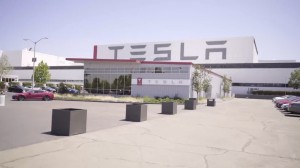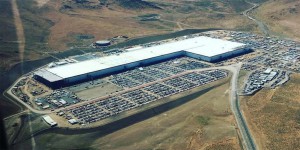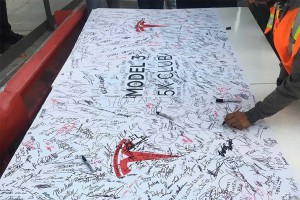
Former Tesla employee Martin Tripp recently told the SEC that Tesla officials are lying about production numbers.
Former Tesla employee Martin Tripp has submitted a tip to the Securities and Exchange Commission accusing Tesla of both misleading investors and allowing potential dangerous vehicles to be sold to consumers.
Until about a month ago, Tripp worked at the Tesla Gigafactory battery plant in Reno, Nevada, but he was fired and subsequently accused by the automaker of committing sabotage in a lawsuit Tesla filed in federal court.
The lawsuit and subsequent tip to the SEC stand to create some havoc for Tesla at a time when the automaker has been hoping to calm the concerns of analysts and investors who have been worried about the slow ramp-up of the critical Model 3 battery-sedan.
Earlier this month, CEO Elon Musk announced that the company had built 5,000 of the vehicles during the last week of the second quarter, meeting its revised production goal. Musk has said that would help put Tesla on the road to delivering a profit for the second half of 2018, along with positive cashflow.
(Tesla sues former employee over alleged sabotage. Click Here for the story.)

Martin Tripp, a former Tesla employee at its Gigafactory near Reno, Nevada, allegedly tried to sabotage the company.
But the tip filed by Tripp on July 6 – and made public this week by his attorney – contends that Tesla has been grossly overstating its production numbers, perhaps by as much as 44%. That doesn’t come as a complete surprise to some observers. Indeed, in the days leading up to Musk’s announcement, the Reuters news service quoted three current Tesla employees who indicated the company was running well short of its 5,000 target.
According to Tripp, the board Tesla used to alert workers at its Fremont, California assembly plant grossly overstatement actual production figures.
He also told the SEC that some of the batteries Tesla used in its vehicles contained “dangerous puncture holes” due to manufacturing defects, and that Tesla “lowered vehicle specifications” to allow battery cells to be packed more tightly together. That could result in fires and even a possible explosion, according to Tripp.
Tripp is believed to have been the source of earlier news reports indicating that Tesla was facing significant quality problems on its battery and assembly lines – or so the automaker indicated in the lawsuit it filed last month in federal district court in Nevada. It alleged the former employees supplied a number of “falsehood” to unnamed news organizations, among other things exaggerating “the amount and value of ‘scrap’ material that Tesla generated during the manufacturing process.”

Fremont workers were invited to sign a poster proclaiming Tesla's new "5K Club." Tripp says it didn't happen.
(Click Here for details about the NTSB investigating latest Tesla vehicle fire.)
The carmaker also alleged that Tripp “hacked Tesla’s manufacturing operating system (‘MOS’) and (transferred) several gigabytes of Tesla data to outside entities.”
It is unclear who those entities are. Also surprising to some observers is the fact that while Tesla has chosen to sue Tripp it notably did not press any criminal charges, something that is common in cases of hacking and the theft of intellectual property. Apple, for example, this week sought the arrest of a former engineer accused of self-driving vehicle technology that he was set to provide to a company in China.
For his part, Tripp said in a new statement that “Getting the truth out has become a nightmare.” He said that he and his family have faced threats and harassment and have had to relocate, though he also said he has received “tons of support.”
His attorney, Stuart Meissner, described the federal lawsuit as a “calculated effort to ruin (Tripp’s) reputation and silence him and other potential Tesla [whistleblowers] from coming forward.”
It’s not the first time Tesla has been accused of taking steps to challenge critics. The National Labor Relations Board currently is looking into allegations that Tesla last year dismissed nearly 1,000 workers at its Fremont plant because they advocated for a union.
(To see more about Tesla’s plans to build a new plant in Shanghai, Click Here.)
Tesla is also facing several federal safety investigations looking at both potential problems with the company’s Autopilot semi-autonomous driving system, as well as battery fires. Two teens were killed in when their Model S sedan’s battery pack caught fire after a recent crash in Florida.

“…Tesla has chosen… not press any criminal charges…”; “Apple… sought the arrest of a former engineer…”. I always assumed that, in order to be arrested, you had to at least be accused of committing a crime.
Read Tesla’s court filing, and the comments from Elon Musk in his letter to employees. He clearly makes accusations that rise to the level of criminality, ie hacking Tesla manufacturing software and copying and distributing its intellectual property. The fact that it so far appears to have sought only civil v criminal actions against the alleged perpetrator strikes me as quite curious.
Paul E.
For those who don’t know him well, Tripp goes by the name of Stormy Daniels.
Actually, Stephanie Clifford.